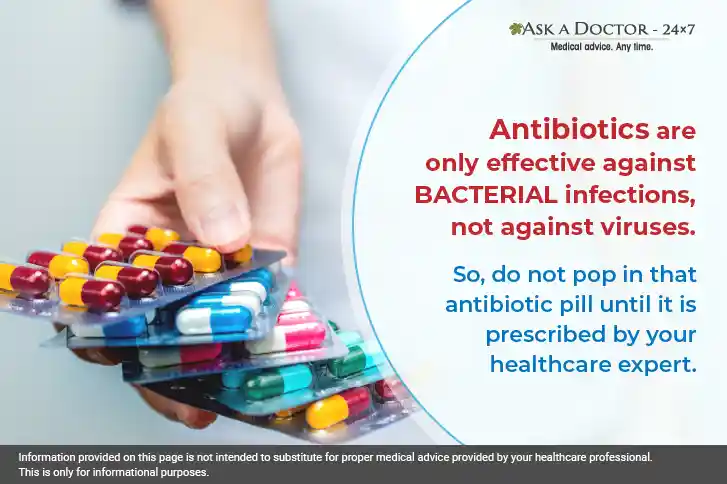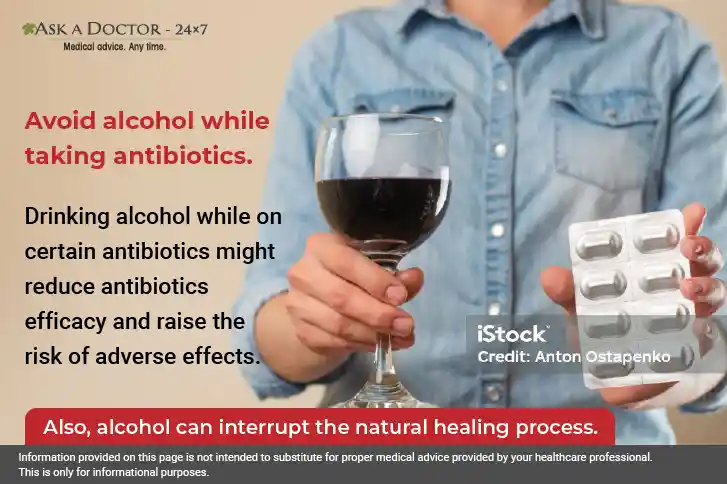Antibiotic Overuse: Know The Risks And Harmful Effects
The development of antibiotics is one of the greatest medical advancements. They are also one of the most commonly used medicines in the world today. Antibiotics are used to ward off bacterial illnesses in humans and animals, either by killing them or by stopping their growth and multiplication. Throughout time, antibiotics have saved countless lives.
Although antibiotics are lifesaving drugs, their misuse is a global issue. Due to the common misconception that antibiotics are helpful in a wide range of diseases, they are misused, and even, at times, prescribed when they are not essential, such as for common colds and viral flu. It is very crucial to know that antibiotic abuse, might result in some chronic side effects. Even though the majority of these adverse effects are not fatal, excessive usage of antibiotics can have serious effects that are difficult to treat. Read on to learn all about antibiotic overuse...
Why Are Antibiotics Overprescribed?
Antibiotics are prescribed by doctors for a variety of reasons, but they are overprescribed in the following conditions:
- Prescribed when unsure of if a disease is caused by a virus or bacteria.
- Prescribed while awaiting test results.
- Prescribed for reasons of patient satisfaction or pressure from the patientŌĆÖs family.
Therefore, some patients could anticipate receiving an antibiotic prescription and even request one from their physician.
What is Antibiotics Misuse?

Misuse of antibiotics happens when a person is prescribed:
- Wrong antibiotic
- Incorrect dose of an antibiotic
- Inaccurate duration of antibiotic intake
- For a disease that does not require antibiotic intervention
5 Harmful Effects of Overconsuming Antibiotics
Unintended consequences of over usage of antibiotics are:
1) Antibiotic resistance
You may become resistant to antibiotics due to drug overuse. When bacteria learn to resist the drugs (antibiotics) designed to kill them, antibiotic resistance occurs. Therefore, the bacteria are still multiplying and pose a threat. According to the WHO, it has become increasingly challenging to treat diseases such as pneumonia, tuberculosis, gonorrhoea, and salmonellosis as the medicines used to treat them have grown less efficient due to antibiotic resistance.
Treatment for infections brought on by resistant pathogens might be challenging or very difficult to treat. These infections frequently necessitate prolonged hospital stays, extra follow-up appointments with doctors, and the administration of potentially expensive and harmful medicines.
2) Gut flora upset
The term "gut flora" refers to the group of bacteria that support healthy digestion, immunity, and gut homeostasis. Consumption or misuse of antibiotics may disrupt the equilibrium of these bacteria in the gut and eliminate good bacteria along with bad ones, leading to a number of health problems. Due to this, people on antibiotics often fall prey to fungal infections in certain parts of their bodies, like the mouth, throat, and vagina.
3) Harmful effects of antibiotics
Overuse of antibiotics can have serious side effects like diarrhea, bloating, nausea, stomach pain, loss of appetite, and constipation.
People who have serious side effects including bloody diarrhea, excruciating stomach pain, or uncontrollable vomiting need to stop taking their antibiotics and call a doctor right away.
4) Drug interaction
Antibiotics can interact with other medications, reducing the power of each to treat a condition. Hence, drug interactions can make an antibiotic less effective or increase the action of a particular drug. To help avoid antibiotic-drug interactions, always review newly prescribed medications with your doctor or pharmacist.
5) Antibiotic-related allergic reactions
In a few cases, some individuals may have an allergic reaction to antibiotics, particularly penicillin and cephalosporins. The allergic reaction is often mild to moderate and manifests itself in one of many ways:
- Itchy, raised skin rash (hives or urticaria)
- Respiratory symptoms like coughing, difficulty breathing, wheezing, and throat tightness
*Antihistamines are often effective in treating these mild to severe allergic responses.
In rare cases, an antibiotic can result in a severe and potentially life-threatening allergic reaction known as anaphylaxis, which is a medical emergency. In such cases, healthcare professionals should be immediately contacted.
Things to Keep in Mind While Consuming Antibiotics

The use of antibiotics should be rational. While using antibiotics, keep the following things in mind:
- Don't insist your doctor prescribe antibiotics: Ask your doctor if your current illness is due to a bacteria or virus. Discuss the risks and benefits of antibiotics. If it's a virus, ask about ways to treat the symptoms. Always remember that no matter how bad your cold symptoms are, taking antibiotics won't help with viral infections.
- Take antibiotics for the full amount of time prescribed by the doctor: Even if your symptoms go away, itŌĆÖs possible that the germs may still be present in your body. So, the entire period of time recommended by the doctor for the use of antibiotics must be followed. If not, the remaining bacteria can continue to multiply and infection can return.
- Do not skip antibiotic doses: Antibiotics are most effective when they are taken as directed by your healthcare provider. By doing this, you maintain a steady level of the drug in your body, allowing the antibiotics to properly treat the bacterial illness. If you miss a dose, take it as soon as you recall. However, if it's almost time, you can skip it and take the subsequent dosage. Never take two doses at once. If you miss many doses or a day's worth of pills, consult your doctor.
- Each medicine has adverse effects: If you have any unusual symptoms or side effects associated with antibiotic usage, let your healthcare provider know. If an antibiotic is creating a bothersome side effect, you may need to stop taking it and finish your treatment with an alternative antibiotic.
- Never take antibiotics prescribed for someone else: Sharing prescription medications of any kind can be dangerous for you. Antibiotics prescribed for other family members may vary in dose and might be ineffective for your sickness, postpone proper care, and even make your situation worse.
- Do not save antibiotics for next time: Never take leftover medicine as an antibiotic is meant for the particular infection at that time.
Conclusion
It is estimated that 20-50% of antibiotic prescriptions for infections are unnecessary. Frequent use of antibiotics for viral illnesses is not uncommon and has increased the prevalence of antibiotic resistance in the community. Antibiotics donŌĆÖt treat viral infections so let minor diseases like flu or sinus infections progress naturally. This lessens the likelihood of bacteria developing antibiotic resistance. Also, antibiotics can have adverse effects or can interact with your ongoing medication, so a person should only use them when a doctor thinks it is essential. Any adverse effects from antibiotics should be reported to your medical practitioner.
If you have any questions related to antibiotic usage or about the dosage assistance, you can check with our doctors at Ask a doctor, 24x7.
Recently Answered Questions Related to Antibiotics and Overuse
- Are There Any Interactions Between Steroids And Antibiotics?
- What Causes Sore Throat, Earaches And Headaches When Still On Antibiotics?
- What Happens If I Miss A Dose Of Z-Pak?
- What Causes Persistent Cough Despite Taking Medication?
- Child Has Loose Motion, Green Stools. Taken Antibiotics. Anything To Worry?
- Should Z-Pak Be Stopped While On Clindamycin?
- Pneumonia, Productive Cough, Blurred Vision, Light Headedness. Taking Z-pack Antibiotics. Cure?
Disclaimer: Information provided on this page is not intended to substitute for proper medical advice provided by your healthcare professional. This is only for informational purposes.
Ask a Specialist
Recent Questions


